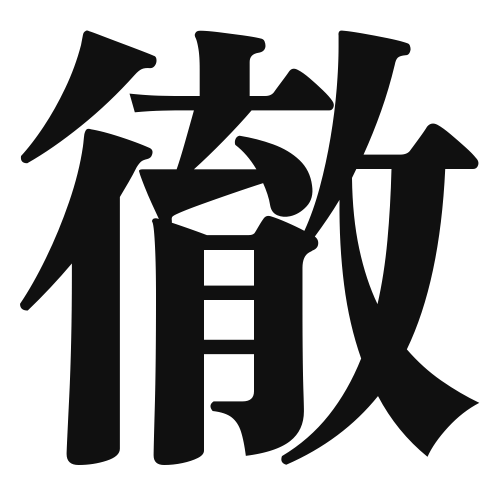1. Overview of Meaning
The kanji “徹” (tetsu) generally means “to penetrate,” “to go through,” or “to thoroughly understand.” It conveys a sense of depth and clarity in understanding or action.
2. Formation and Radical
Formation of the Kanji: The kanji “徹” is a phono-semantic compound (形声文字), which means it combines both a phonetic and a semantic component. The left part “彳” (which relates to walking or movement) suggests action, while the right part “哲” (which means wisdom or philosophy) indicates understanding or insight.
Radical: The radical of “徹” is “彳,” which is associated with movement or walking.
3. Examples of Usage
Common Words and Phrases:
- 徹底 (てってい, tettei) – thoroughness
- 徹夜 (てつや, tetsuya) – staying up all night
Example Sentences in Daily Conversation:
- 彼は問題を徹底的に調べました。 (かれは もんだいを てっていてきに しらべました。) – He thoroughly investigated the problem.
- 徹夜で勉強したので、今日は眠いです。 (てつやで べんきょうしたので、きょうは ねむいです。) – I stayed up all night studying, so I’m sleepy today.
4. Synonyms and Antonyms
Similar Kanji:
- 深 (しん, shin) – deep; while “徹” implies thorough understanding, “深” focuses more on physical or metaphorical depth.
Antonyms:
- 浅 (あさ, asa) – shallow; it represents a lack of depth or understanding, contrasting with the thoroughness implied by “徹.”
5. Cultural and Historical Background
Relation to Japanese Culture: The concept of “徹” is significant in Japanese culture, where thoroughness and attention to detail are highly valued in various aspects of life, including work and education.
Proverbs and Idioms:
- 徹底的にやる (てっていてきにやる, tetteiteki ni yaru) – to do something thoroughly; this phrase emphasizes the importance of complete dedication to a task.
